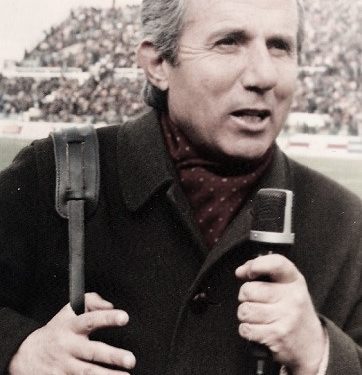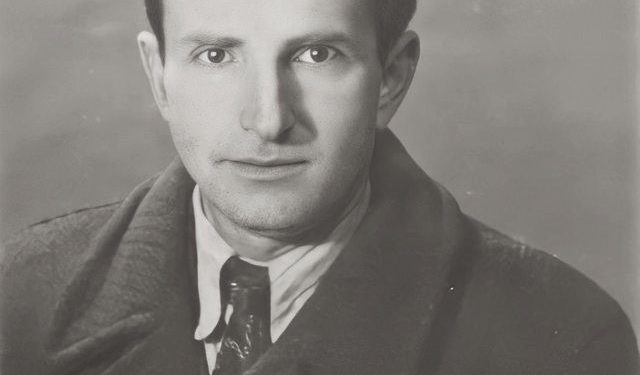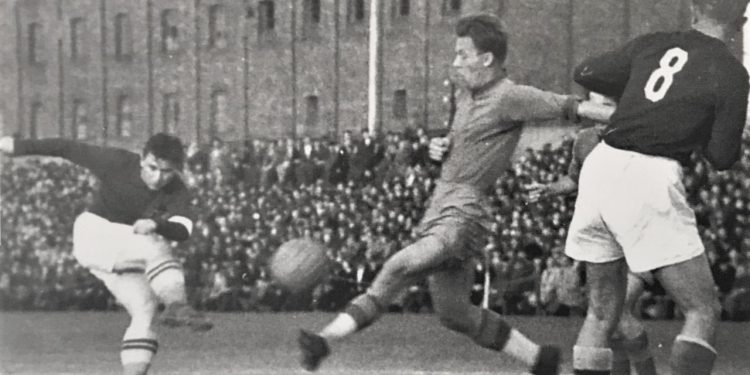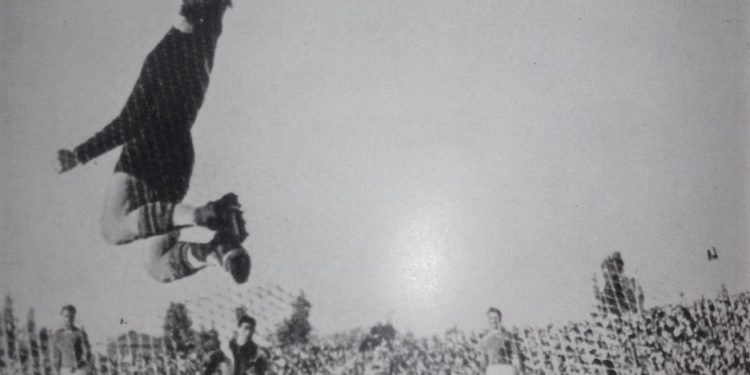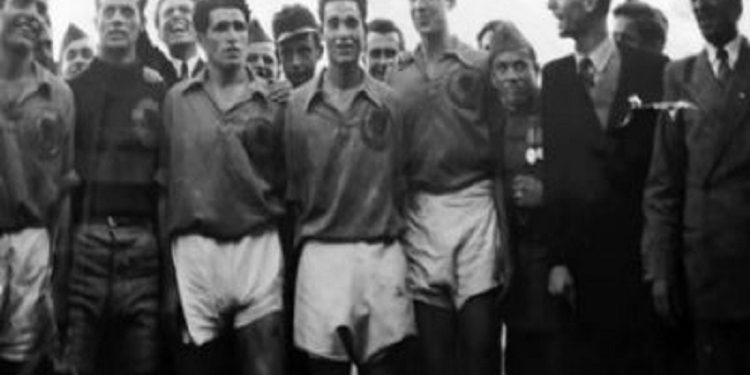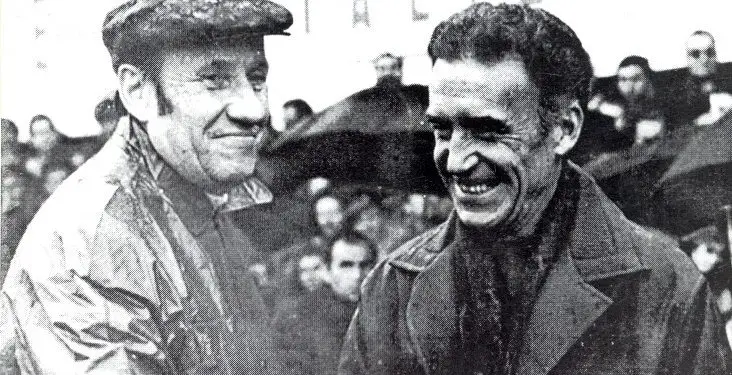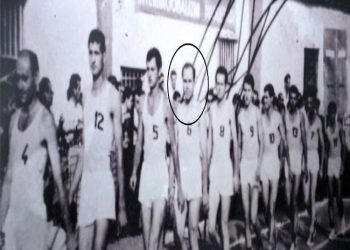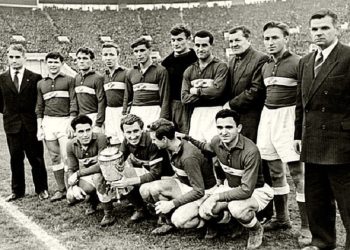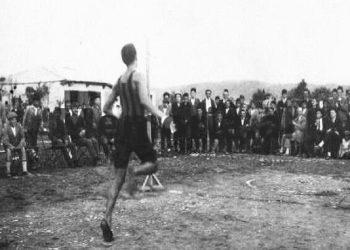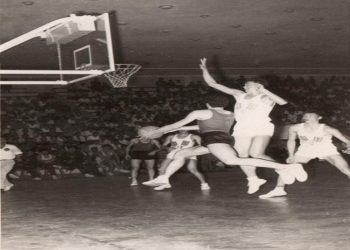By Skifter Këlliçi
Memorie.al / “Do you remember, Loro, when I saw you for the first time in the stadium…?” I asked Boriçi this question late that afternoon of June 20, 1972, as the airplane had just taken off from the gray runway of Helsinki airport, to take our representative team (which I was accompanying as a journalist) to Budapest, from where they would travel by train to Belgrade and then by bus to Tirana. Unfortunately, that’s how they used to make trips abroad at the time…!
Sitting next to me, Loro shrugged his shoulders and smiled a little in surprise. And he was right.
“One October afternoon in 1945, when I was only seven years old,” I continued, “and when the Tirana representative team, in which you also played, won 5-2 against the Macedonian national team at the Tirana stadium, which would later be called ‘Qemal Stafa.’ Do you remember…?”
“Of course, I remember,” Loro replied. “I had scored three goals in that match…”
“One of which was a penalty kick,” I added…!
“How well you remember them…!”
I had had the opportunity until then to talk to Boriçi about sporting events, especially in interviews on Radio-Tirana and Albanian Television, but never this long, for more than two hours during this flight.
I reminded Loro that ever since that match I had watched, along with other children from the neighborhood, I had fallen in love with him, also because he was from Shkodër, like my mother.
So, a year later, again with the children of the neighborhood, I followed the 1946 Balkan Cup, when after the victory against Bulgaria (3-1), Boriçi scored two goals, and after the other victory against Romania (1-0), Albania became the Balkan football champion, and he raised the cup of victory high on the podium.
I explained to Loro that from then on, many of us minors pressured our mothers to sew the number 9 on our vests, the number he wore, the great center-forward Boriçi, the captain of the national team and ‘Vllaznia,’ two-time champion in 1945 and 1946.
After these words, Loro laughed, even more so when I reminded him that back then, on the cabin of an old truck, on the road that split our neighborhood in two where we played football, I would imitate Anton Mazreku and call a kid, taller than us, “Our Boriçi,” whom all the children envied because he played so beautifully with the ball, especially the one made of rags…!
Thus, as the airplane cut through the clouds, flashing from the sun’s late rays, I continued to tell Loro other memories connected to his life on the football fields.
In 1953, Boriçi had been playing for ‘Partizani’ for six years, starting from the years 1947–’48, when he had completed his military service. And we children, like thousands upon thousands of others across Albania, had become fans of ‘Partizani,’ because we adored… Loro.
I reminded him of the time in the championship final that year against ‘Dinamo,’ when he headed the ball past the goalkeeper Vogli, who froze; the ball hit the ground, went wide, and after a few minutes, Bakalli scored and ‘Dinamo’ won 1-0, being declared champion.
He explained to me that that moment was one of the bitterest memories of his life as a footballer. (A year later, in an interview included in the Kinostudio documentary film “Across the Football Fields,” Loro and I found ourselves in front of the same goal on the ‘Qemal Stafa’ stadium field, where he explained to me that: if he had shot 100 times, he would have scored just as many goals).
In the mid-’50s in Albania, it was not known what the game with a withdrawn center-forward in the WM system (3-2-3-3) was. But I, although 13-14 years old, was impressed that Loro would drop back, while the two inside-forwards would join in a line with the wingers (3-3-4).
But years later, when I had become a journalist, I read in the foreign press that this was how the great Hungarian center-forward, Hidegkuti, had started playing.
I asked Loro if he had been influenced by him. He laughed. “No,” he replied, “because I had only played against him once in 1950 in Budapest, but I felt that this was how international football should be played.”
What intuition this great footballer had?! It was not for nothing that after the Hungary – Albania match that year, as my teacher and later colleague, Mazreku, who had commented on the match, explained to me later, the Hungarians had told him that a center-forward like Boriçi was needed by the legendary Hungary of the ’50s.
While he was talking, I remembered an article by Anton Mazreku, published in 1938 in the newspaper “Sporti Shqiptar,” where he had been impressed by the beautiful play of a 16-year-old ‘Vllaznia’ footballer who stood out greatly. He was referring to Loro.
Four years later, Mazreku again, in the daily “Tomori,” when describing the ‘Juventus’ – ‘Lazio’ match played in Turin, in which the Albanians Lushta and Boriçi faced each other, after evaluating both, emphasized: “Boriçi, 20 years old, a player with an enviable physique, with a brilliant future ahead of him.” And he was not mistaken.
Then I asked Loro if he remembered when we had met. I didn’t think he would remember. But it didn’t happen that way. “In the spring of 1962,” he explained without much thought, “when you invited me to a Radio Tirana studio for an interview, after I had been given the title ‘Merited Master of Sport.'”
And he was the first to whom this title was given, especially when, after returning from his higher studies in Bulgaria, 1962–’63, ’64–’65, he had led ‘Partizani’ to become champions, and in 1971, also Balkan champions…!
We were only pulled away from this conversation with such moving memories by the voice of the airplane pilot, who informed us that we were landing at the Belgrade airport…!
…Once, ironically, in the late hours of an October afternoon in 1981, a year before he passed away, fate brought it about that I met Boriçi, queuing in front of a store, to buy… potatoes…!
Those that the dictator Enver Hoxha called both bread and meal. But we didn’t have a chance to talk, because the buyers, as soon as they spotted him, against his wishes, put him first in line.
“What misery,” a trusted friend told me in a low voice. “This footballer who would have played in any sports club in Europe and would have become rich, out of the desire to elevate the glory of football, had returned to the homeland to remain poor, but loved and respected, like many other talents like him.
That is why when he is remembered, even children who have not known him say of him: ‘Loro of the ball, Loro and of all!'” Memorie.al




